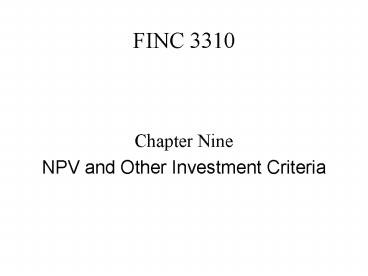FINC 3310
1 / 24
Title:
FINC 3310
Description:
B. Discounted payback period ... of time until cash flows recover investment, but the cash flows are discounted. ... assume the appropriate discount rate is 10 ... – PowerPoint PPT presentation
Number of Views:31
Avg rating:3.0/5.0
Title: FINC 3310
1
FINC 3310
- Chapter Nine
- NPV and Other Investment Criteria
2
Abbreviations and Symbols
- CF cash flow
- NPV net present value, a dollar measure
- IRR internal rate of return, a measure
3
Getting Started
- Consider two projects that each cost 15,000.
- Cash flows A B
- 3,000 4,000
- 4,000 4,000
- 8,000 4,000
- -0- 4,000
- -0- 4,000
- Which project(s) should be taken? We will
evaluate the projects using the following
investment criteria
4
Getting Started, continued
- A. Payback period
- B. Discounted payback period
- C. Net present value
- D. Internal rate of return
5
A. Payback period
- Why? It's easy! The payback is defined to be
the amount of time until cash flows recover the
cost of investment (counted in years). - Criteria Payback of x years or less (where x
depends on management's discretion). - Payback(A)
- Payback(B)
6
A. Payback period
- Problems
7
B. Discounted payback period
- This is designed to keep the ease of the payback
method, but correct for the time value of money
problem. Here, payback is again the length of
time until cash flows recover investment, but the
cash flows are discounted. Using the values for
projects A and B, assume the appropriate discount
rate is 10. What are the paybacks now?
8
B. Discounted payback period
- Discounted CFs for A Discounted CFs
for B - 1
- 2
- 3
- 4
- 5
- Disc. Payback(A)
- Disc. Payback(B)
9
B. Discounted payback period
- Problems
10
C. Net present value, or NPV
- where
- CFt cash flow in year t
- IO initial outlay
- Criterion NPVgt 0 Þ accept project. Why?
11
C. Net present value, or NPV
- Use the same cash flows for projects A B
again, and again let the interest rate be 10.
Which, if either, project is now acceptable? - NPV(A) at 10
- NPV(B) at 10
- So, in this case, NPV gives OPPOSITE
recommendation of the payback method!
12
D. The Internal Rate of Return, IRR
- This is the rate that in the NPV equation makes
NPV O, or IRR r " r ' - What does this mean economically? How do we
interpret the IRR?
13
D. The Internal Rate of Return, IRR
- These are the NPV Profiles for projects A and B.
What can we say about the relationship between
NPVs and IRRs?
14
D. The Internal Rate of Return, IRR
- Recall, what is NPV decision criterion? NPVgt0
Þ accept - What you think this will mean for IRR?
- IRR gt RRR Þ accept
- Do you see the relationship?
- If IRR gt RRR ÞNPV gt 0
- If IRR lt RRR ÞNPV lt 0
- So for any single project, IRR and NPV provide
the same accept or reject decision.
15
D. The Internal Rate of Return, IRR
- IRR(A)
- IRR(B)
- Note that for any interest rate, Project A will
have a negative NPV and an IRR lt RRR, so Project
A should not be accepted. Recall that payback
ranked A above B!
16
D. The Internal Rate of Return, IRR
- How do you solve for the IRR?
- 1) If cash flows are even, this is like an
annuity, so solve for factor and look it up in
the tables. - 2) If cash flows are uneven, you must take some
special steps...called trial and error! - 3) You may need to interpolate.
- Recommendation use a financial calculator!
17
Solving for the IRR Example
- A 50,000 investment has 4 years of cash flows
as follows 20,000 in year 1, 15,000 in years 2
and 3, and 10,000 in year 4. What is the IRR? - The first step is to create a pseudo-annuity to
help us eliminate bad guesses. - 60,000/4 15,000 "annuity"
18
Solving for the IRR Example
- The second step is to find the interest rate that
solves our pseudo-annuitys IRR - 50,000 15,000(PFIVAr,4)
- 3.333 PVIFAr,4
- Looking up this factor, we find that the closest
r is 8. This is not the IRR for our investment
project! It is just our first guess! And it is
not the best we can do! Why? Due to moving early
cash flows to later ones in averaging, our 8 is
too low. Go to 9.
19
Solving for the IRR Example
- CASH FLOWS PVIF (8) Disc. Flow PVIF (9)
Disc. Flow - 20,000 .9259 18,518.52 .9174
18,348.62 - 15,000 .8573 12,860.08 .8417
12,625.20 - 15,000 .7938 11,907.48 .7722
11,582.75 - 10,000 .7350 7,350.30 .7084
7,084.25 - S 50,636.38 S
49,640.83 - So, the IRR is between 8 and 9. Here is a
chance to interpolate.
20
Solving for the IRR Example
- Interpolating, or between the poles
- 8 9
- ½__________½___________½
- 50,636.38 50,000 49,640.83
- Interpolation is based on the relationship a/b
c/d - 636.38 C
- 995.55 1
- C .0064
- So, IRR .08 .0064.0864 8.64
- What if RR 10?
21
Problems with IRR
- Multiple values are possible.
- No IRR is possible.
22
Problems with IRR, continued
- When projects are mutually exclusive, conflict
between IRR and NPV rankings is possible. This
problem is based on size or lifetime disparity
in projects, or patterns of cash inflows.
23
Problems with IRR, continued
- Where do the NPV profiles cross? What does that
tell us about the conflict?
24
Problems with IRR, continued
- The reinvestment rate assumption may be less
realistic



















![Download Book [PDF] Anxiety Relief Word Search for Adults: Therapeutic Full Colour Pages, 3310 PowerPoint PPT Presentation](https://s3.amazonaws.com/images.powershow.com/10087090.th0.jpg?_=20240727019)











